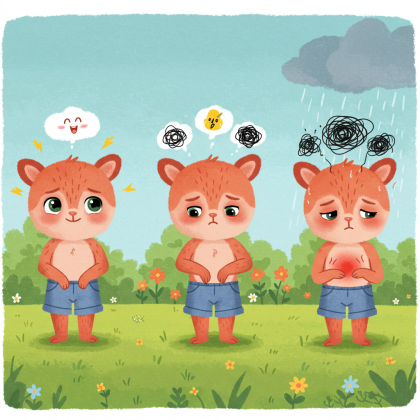Stress Isn’t Just Mental
Everyone experiences stress. In small doses, it can be helpful — keeping you alert, focused, and motivated. But when stress becomes chronic, staying with you for weeks, months, or even years, it begins to do more harm than good.
Chronic stress doesn’t just affect your mind. It affects your entire body: your immune system, digestion, hormones, sleep, skin, and even your heart. And many people live with these effects without even realizing stress is the root cause.
This article takes a science-based look at how chronic stress impacts your health — and what you can do to reduce its power.
Explore more evidence-based health insights at:
https://healthmanual.net/healthtips/
1. What Is Chronic Stress?
Stress is your body’s natural reaction to any challenge or threat, triggering the “fight or flight” response. This causes a surge in stress hormones like cortisol and adrenaline.
Chronic stress occurs when that response stays active over long periods — even when there’s no immediate danger.
Common sources of chronic stress include:
- Job pressure or financial struggles
- Relationship issues or caregiving responsibilities
- Health problems or chronic illness
- Trauma or unresolved emotional pain
- Information overload and digital burnout
Unlike short-term stress, chronic stress wears down your body over time.

2. The Brain Under Stress
Your brain is the control center of the stress response.
- The hypothalamus signals your adrenal glands to release cortisol
- High cortisol levels help you respond to threats — but when prolonged, they cause harm
Chronic stress can:
- Shrink the hippocampus (memory and learning center)
- Increase activity in the amygdala (fear center)
- Disrupt communication between brain regions that regulate mood and judgment
This is why chronic stress is linked to:
- Depression and anxiety
- Brain fog and memory problems
- Emotional reactivity and irritability
Over time, it rewires the brain — making stress your default mode.
3. Effects on the Immune System
In the short term, cortisol suppresses inflammation. But with long-term stress, your immune system becomes dysregulated.
- Overexposure to cortisol weakens immune defenses
- You may get sick more often or take longer to recover
- Chronic inflammation can increase, fueling conditions like arthritis or autoimmune disease
This imbalance leaves you more vulnerable to infections and less able to heal.
4. Hormonal Imbalance and Fatigue
Your adrenal glands aren’t designed to produce high levels of cortisol indefinitely.
- Eventually, they may struggle to keep up, leading to adrenal fatigue
- You may feel constantly tired, even after sleeping
- Hormones like insulin, estrogen, and thyroid hormones can also be affected
Symptoms of hormone disruption include:
- Weight gain (especially belly fat)
- Mood swings or PMS
- Low libido
- Brain fog
- Irregular sleep cycles
Stress doesn’t just drain you — it throws your entire hormonal system off balance.
5. Gut-Brain Connection: Stress and Digestion
Stress and digestion are deeply linked through the gut-brain axis.
Under stress:
- Blood flow is redirected away from the digestive system
- Stomach acid production may decrease or increase erratically
- Gut motility slows down or speeds up, causing constipation or diarrhea
Over time, stress can lead to:
- Irritable Bowel Syndrome (IBS)
- Leaky gut syndrome
- Food sensitivities
- Changes in the gut microbiome
If you experience bloating, nausea, or discomfort during stressful times, your gut is speaking to you.
6. Cardiovascular Strain
One of the most serious effects of chronic stress is on the heart and blood vessels.
- Constant high cortisol raises blood pressure
- Blood sugar and cholesterol levels may also rise
- Inflammation in arteries increases risk for plaque buildup
This significantly increases your chances of:
- Heart disease
- Stroke
- Heart attack
Stress isn’t just emotional — it’s a cardiovascular risk factor.

7. Stress and Skin, Hair, and Sleep
Stress often shows up in physical appearance and rest patterns.
Skin
- Worsens acne, eczema, and psoriasis
- Delays wound healing
- Triggers itching or hives due to immune changes
Hair
- Can trigger or worsen hair loss (telogen effluvium)
- Affects hair growth cycles via hormonal disruption
Sleep
- Makes it harder to fall or stay asleep
- Poor sleep increases cortisol, creating a vicious cycle
- Lack of deep sleep impairs recovery, memory, and mood
When you’re stressed, your body never truly rests.
8. How to Break the Chronic Stress Cycle
It’s impossible to eliminate stress completely. But you can build resilience and reduce its impact through science-backed strategies:
Practice Mindfulness
- Daily meditation or breathing exercises calm the nervous system
- Even 10 minutes a day can reduce cortisol levels
Prioritize Sleep
- Go to bed and wake up at the same time
- Limit screens and caffeine before bedtime
Move Your Body
- Exercise reduces stress hormones and boosts endorphins
- Walking, swimming, or yoga work well — no need for high intensity
Eat for Balance
- Avoid sugar and processed foods that worsen inflammation
- Focus on whole foods: vegetables, healthy fats, and lean protein
Stay Connected
- Healthy relationships buffer stress
- Talk to a friend or therapist — isolation increases stress load
Conclusion: Chronic Stress Is Manageable, Not Inevitable
Chronic stress is more than a feeling — it’s a full-body issue that can quietly damage your brain, hormones, heart, immune system, and digestion. But by understanding the mechanisms and adopting targeted strategies, you can protect your health and regain control.
The key is consistency: small, daily actions are more powerful than occasional big efforts.
Want more research-based wellness strategies?
Visit the Health Tips section at:
https://healthmanual.net/healthtips/

Hi, I’m Hibiki — the writer behind HealthManual.net.
I cover health insurance news, wellness tips, and insightful analysis of pharmaceutical and healthcare stocks. My goal is to simplify complex topics and make health and finance information more accessible to everyone.
Thanks for reading — I hope you find the content helpful and reliable.











